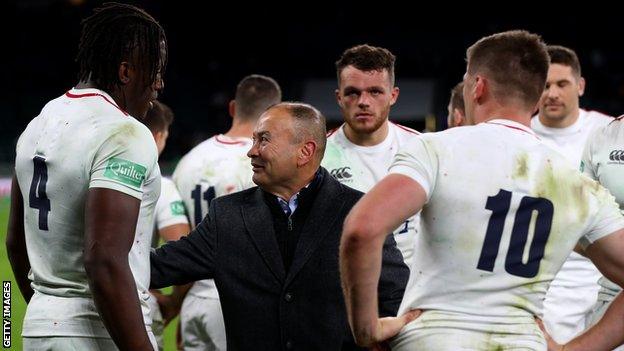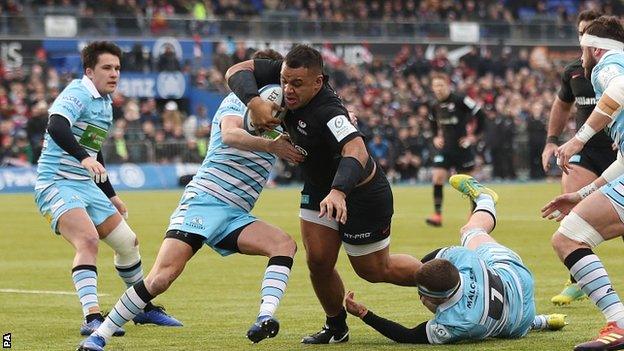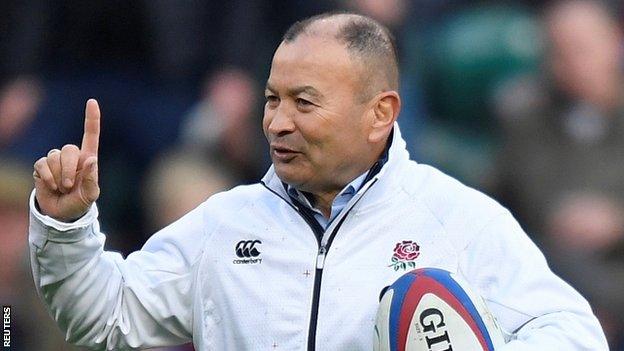Six Nations 2019: England head coach Eddie Jones' defining year
- Published
- comments

Eddie Jones' England face defending champions Ireland in their opening Six Nations match in Dublin on Saturday
Guinness Six Nations |
|---|
Dates: 1 February-16 March |
Coverage: Watch live coverage on BBC TV, BBC iPlayer, Connected TVs and online; listen to match commentaries, shows and podcasts on BBC Radio 5 live, sports extra and BBC Sounds; follow text updates and watch highlights on the BBC Sport website and mobile app. |
Eddie Jones understands how a World Cup can change your life.
As Australia coach in 2003 he watched Jonny Wilkinson metamorphose from exceptional player to English national icon. As assistant to the Springboks in 2007 he saw South Africa's president carried aloft on the victorious players' shoulders. In 2015 the late try from Karne Hesketh that saw his Japan side shock South Africa arguably got him the England job, for would the RFU have appointed the coach of a side who merely failed to escape the group stages having just sacked one who did exactly that?
And so, as 2019 rolls along, the Six Nations upon us and the next World Cup only a handful of friendlies away after that, Jones is entering what may be the defining year of his decorated and pugnacious coaching career.
There will be no easing into it, not when it begins with a trip to Dublin, a city where England have won only one of their past seven in the Six Nations, not with Ireland currently reaching fresh heights under the contrasting approach of Joe Schmidt.
Ireland are second in the world rankings and have beaten the only team above them, the All Blacks, twice in the past two years. Third are Warren Gatland's Wales, who England also play away from home this February.
These coaches have their own challenges in 2019. Schmidt, who took his side to the championship title in 2014, 2015 and 2018 with the Grand Slam won last year, must keep the momentum going for a nation which has never progressed beyond the quarter-finals of a World Cup. Gatland, with Wales having won their past nine matches, needs a World Cup peak to match that of 2011 and a proven depth of squad that wasn't there four years later.
Jones? Jones arguably needs more than both. After his extraordinary start - 22 wins in 23 matches, a Grand Slam, a 3-0 whitewash in Australia - he and his side are still recovering from the precipitous nose-dive that followed: three matches lost in last year's Six Nations, only Italy below them in the final table, a series defeat in South Africa last summer.
Six Nations: Which player from another country would you want in your team?
Throughout his 20-year coaching career Jones has moved across the globe but stayed true to his essential characteristics. Obsessive. Innovative. Caustic. Aggressive. Hard-working. Controlling.
It has brought him great success but also intractable problems. He took Australia into extra-time of that 2003 World Cup final but then lost eight of his last nine with the Wallabies; he found a wonderful way with Japan, having had them together for five months before the 2015 tournament, but was also sacked by the injury-stricken Queensland Reds with the side bottom of the Super 14 table.
Jones has won 80% of his games in charge, the best record in England's history, but the margins for error are now minute. He has repeatedly referenced this autumn's World Cup as the focus of his four years in charge. He has talked about the date of the final in Yokohama (2 November). It is all about this year.
Can he maintain that famous eye for detail without becoming domineering? Can he be fanatical about standards without exhausting the players and coaches around him? Can he take a side that three years on are still a work in progress and turn them into champions when it matters most?
On the pitch his task comes down to three things: defining a style, finding the blend, making it last.
The first began to come together over the autumn. Relentless, physical, smashing the gain-line. It will be about a ferocious set-piece and big ball-carriers rather than all-court action.

Saracens number eight Billy Vunipola, who sat out last year's Six Nations, is back in the England side after missing the autumn internationals
With an easing of his injury list is starting to come the blend. Billy and Mako Vunipola are both back. So too is Maro Itoje and a fit Nathan Hughes. He could name a bulldozer centre partnership of Ben Te'o and Manu Tuilagi and also have the giant Joe Cokanasiga on one wing, should he be fit.
Now for the questions. Will that approach work against the best defences in the world? In November Ireland kept New Zealand try-less. Not in 96 matches and seven years had they scored so few points in a Test.
England, even in their better performances last year, played only in patches. One fine half against the All Blacks and Springboks, an excellent 20 minutes against Australia, scoreless for the final hour against Wales.
There is still too the impression that the big decisions come from the bench rather than on the field. Should plan A not work, is there the freedom and flair to find another way? Are the players allowed to be innovators too, or must they stick to a prescribed plan.
It is a task made harder by the successes of those rival coaches.
Schmidt has taken a style that defines Irish rugby and finessed and distilled it to its rich essence. The players know exactly what the coaches demand, and what the coaches want is tailored to those players' explicit abilities.
Those who have worked with him speak of a man who can tell those under him what they need to know without making it feel like a personal attack. There are exceptionally high standards under Schmidt but no bullying.
Gatland, in the final year of more than a decade in charge, seems more relaxed than ever before. Some of that is down to the resources at his disposal. "The Welsh are just totally in sync and aligned with what they want to do tactically and technically," said South Africa coach Rassie Erasmus after his side lost in Cardiff last autumn.
Some of that is experience - 153 Tests as a head coach, more than Jones' 140, more than Steve Hansen or even Sir Graham Henry. There is trust too from his players, who talk about his man-management skills, his ability to work out what makes each man tick and adjust his approach accordingly.
Jones will be in his 60th year when the World Cup in Japan gets under way, an age when most coaches still in employment find it easier to fall back on the familiar rather than change their ways.
And so expect more brutal training sessions, even though under Jones England players were five times more likely last season to be injured on international duty than with their clubs, even though winger Jonny May has spoken of being "put in a position where he makes or breaks you," where centre Jonathan Joseph describes his coach as "the hardest task-master I've known, a blessing and a curse at the same time".

Jones hopes to lead his side to victory in the World Cup final in Yokohama on 2 November
Maybe this Six Nations will mean little come September. Under Stuart Lancaster England won their last game of the 2015 tournament in glorious style, beating France 55-35, yet fell apart in the autumn. Scotland finished bottom of the table that same year without a single win yet were a controversial refereeing decision from Craig Joubert away from a World Cup semi-final against Argentina.
England have been blessed with a favourable World Cup pool, the other tier one nations a struggling France and inconsistent Argentina. Win that group and on form it could be a currently crisis-hit Australia in the quarter-finals.
Equally Jones may have to get past Wales in the first knockout stage, and then Ireland in the semi-finals. It is why many feel that his side have to take at least one win away from home in Dublin or Cardiff next month. To lose both, this year of all years, would be damning.
Schmidt leaves Ireland after the World Cup, to be succeeded by Andy Farrell. Gatland will be gone too, his fellow Kiwi Wayne Pivac taking over.
Jones? It all depends. He has a two-year extension to his deal beyond the autumn, but there is a break clause. Fail to make the semi-finals at least and his time may be up.
Pressure, everywhere you look at it. Jones will relish it but he must also survive it and thrive.
England's Six Nations fixtures | ||
|---|---|---|
Date | Opponents | Venue |
2 Feb | Ireland | Aviva Stadium, Dublin |
10 Feb | France | Twickenham |
23 Feb | Wales | Principality Stadium, Cardiff |
9 March | Italy | Twickenham |
16 March | Scotland | Twickenham |